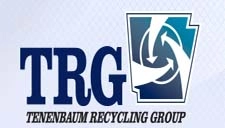
Tenenbaum Recycling Group, LLC (TRG) is a full-service scrap metal processing and recycling company with multiple locations across the state. Our network of scrap yards and service centers, consisting of TRG North Little Rock, TRG Jonesboro, LLC, TRG Harrison, LLC , TRG Rogers, LLC, TRG Berryville, TRG Russellville, LLC, Express Recycling, TRG Hot Springs, LLC, TRG Fayetteville, LLC, TRG Reeds Spring, LLC, and Arkansas Aluminum Alloys, Inc., collect, process and recycle ferrous metals (iron and steel) and nonferrous metals (such as aluminum, copper, stainless steel, nickel, brass, and others).
Established in 1890, when all that was needed was a cutting torch, some alligator shears and something to move the material with, TRG has since grown to be one of the top businesses in the State of Arkansas. We take pride in our history and maintain an ongoing commitment to provide the most reliable service, efficient process, competitive pricing, environmental compliance, and high quality product available. As part of this commitment, we are constantly investing in improvements to our facilities, technology, and way of doing business. For our suppliers of scrap metal, we have modern unloading equipment and convenient hours. We provide industrial suppliers with large onsite containers with pick up, special equipment and other material handling services included. For our purchasers of process scrap, we transport in bulk or containers via ships, barges, rail cars, and trucks, all across the globe.
Tenenbaum Recycling Group, LLC (TRG), Arkansas’ largest recycler and processor of scrap metal was established in Little Rock over a century ago. In 1886, a Russian immigrant named Abraham Tenenbaum arrived in Little Rock driving a wagon loaded with tin ware. He liked this land they called Arkansas and decided to build his future here.
By 1890, he had accumulated enough capital to rent a small warehouse. He had a sign painted that read: “A. TENENBAUM COMPANY: BUYER OF HIDES, FURS, WOOL, BEESWAX, BURLAP BAGS,SCRAP IRON AND METALS,” and a new business was born. Over the next decade, the company grew with the local economy, shipping its products to both regional and national markets. In 1900, Julius Tenenbaum, nephew of Abraham, joined this growing company. The scrap industry began to prove its importance to the country during these early years. Cowhides were purchased from farmers and butchers and shipped to tanneries. Ferrous and nonferrous materials were accumulated and shipped to foundries and smelters, then processed into goods for the general public. In the spring of 1933, Joe M. Tenenbaum, son of Julius, joined the firm as the company continued to grow. Technology was changing and many items that formerly were collected and sold were no longer in demand.
The great depression of the early thirties brought about unusual circumstances. As with most small companies during these years, A. Tenenbaum Company, Inc. had to survive with limited capital. Most commodities could not be sold as a price that would permit the seller to break even. Many of the smelters and foundries closed, and scrap began to pile up around the countryside.
A.Tenenbaum Company, Inc. decided to continue to buy metals and hides and hold them until such time as the economy improved. This market strategy has proven to be profitable for the company at certain times during the last century.
Scrap metal recycling is an important factor in conserving natural resources and providing environmental protection while offering valuable raw materials to manufacturers. Each year we process over 350,000 tons of steel that would otherwise be sent to the landfills.
According to the Institute of Scrap Recycling Industries (of which we are members), by using recycled metals, the steel industry saves enough energy each year to power 18 million households.
TRG’s ferrous metal processing handles a vast array of scrap, including by-products from the engineering sector, worn-out vehicles, discarded consumer appliances such as fridges and freezers, out-of-date tools and machinery, dismantled buildings and other steel-related structures and much more.
Ferrous metals are in the form of steel and iron and commonly take on magnetic qualities. While this is not always the case (certain grades of stainless steel are considered ferrous but are not magnetic, just as cobalt is a magnetic but non-ferrous metal) ferrous metals are most commonly separated from nonferrous and other waste materials using commercial-grade magnets. Our advanced magnetic separation equipment and induction sorting systems ensure that materials are separated and processed appropriately.
| No | Material Name |
|---|---|
| Automotive | |
| 1 | Catalytic Converters |
| Batteries | |
| 2 | Batteries |
| Metal | |
| 3 | Aluminum |
| 4 | Aluminum Beverage Cans |
| 5 | Aluminum Cans |
| 6 | Brass |
| 7 | Copper |
| 8 | Stainless Steel |
| 9 | Zinc |
| 4500 W. Bethany Rd North Little Rock, Arkansas United States ZIP: 72117 |
| (501) 945-0881 (501) 945-3865 info@trg.net |
| 448 Emerson Rd Reeds Spring, Missouri United States ZIP: 65737 |
| (417) 272-9100 NS info@trg.net |
| 1479 Sparksford Drive Russellville, Arkansas United States ZIP: 72802 |
| (479) 967-0177 NS info@trg.net |
| 3459 N. Arkansas St Rogers, Arkansas United States ZIP: 72756 |
| (479) 621-8800 NS info@trg.net |
| Tuesday | From 8:00 am To 4:00 pm |
| Wednesday | From 8:00 am To 4:00 pm |
| Thursday | From 8:00 am To 4:00 pm |
| Friday | From 8:00 am To 4:00 pm |
| Saturday | From 8:00 am To 4:00 pm |
| Sunday | Closed |
| Closed |